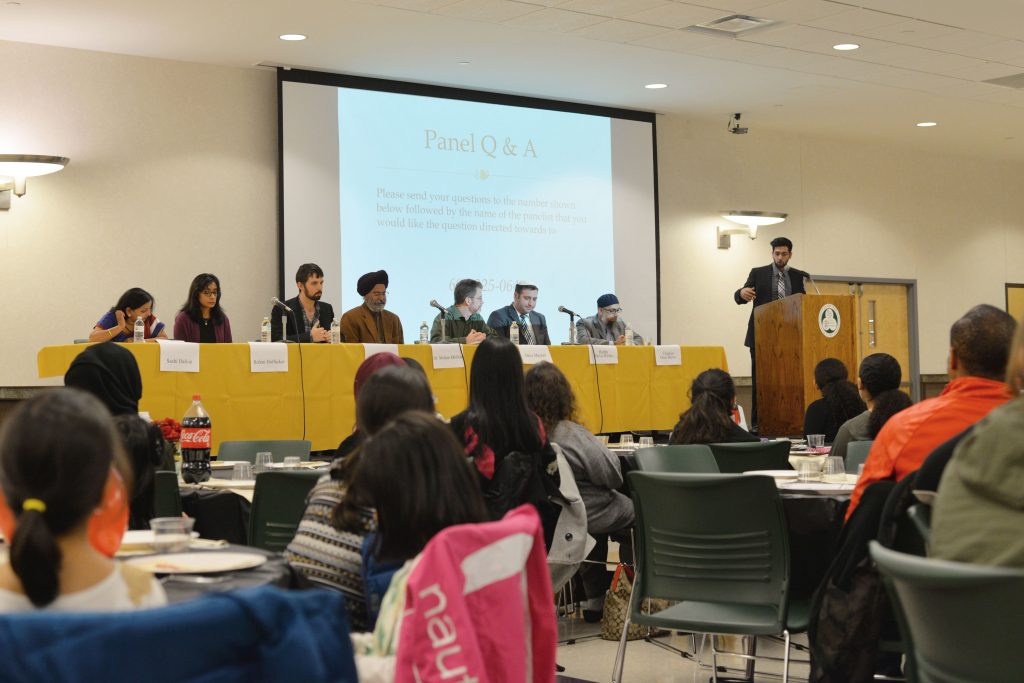
In a time where much of the nation is divided over differences in thought, the Muslim Student Association (MSA) at Binghamton University brought over 200 students of different religions together on Saturday evening for a “coexistence banquet.”
The event, which was called “Erasing the Lines” and was held in Old Union Hall, was a new take on the club’s banquet, which happens every semester, previously directed only toward the Muslim community. Students across religious groups were invited, including Hillel at Binghamton and the Arab Students Organization, to promote unity and peace. Habeeb Sheikh, the president of MSA and a senior double-majoring in political science and cinema, said that he wanted to use this semester’s banquet to promote solidarity.
“One thing I’ve always wanted to do is unite the campus among religions,” Sheikh said. “You have a lot of people talking about how America is breaking apart. This is a small step in showing that we’re not dividing, we’re unifying. Everyone here saw each other as a human being regardless of their religion.”
The banquet opened with a speech from Omer Bajwa, director of Muslim life in the Yale University Chaplain’s Office, who graduated from BU in 1998 with a degree in English. Bajwa, a Muslim, spoke about the importance of an open dialogue among people of different cultures and creeds in light of the recent election.
“We have to fortify each other in the same way that the bricks of a wall form an impenetrable surface,” Bajwa said. “That needs to be the work of coexistence.”
Bajwa was then joined by the six other panelists: Rabbi Akiva Weiss, who represented Judaism, Dave Mayner, who represented Christianity, Andrew Towers, who represented Buddhism, Sashi Dalvie and Rohini Hoffacker, who represented Hinduism and Mohan Dhillon, who represented Sikhism. When the panelists were asked if they believed religion was a cause of violence in the world, Weiss instead focused on the positive things it brought.
“There’s a lot of things done in the name of religion,” Weiss said. “I think religion is the cause of great light in the world.”
The panelists also discussed differences between their religions, what they learned from each other during the panel and how their religion is able to coexist in modern U.S. society.
“I learned from every religion that we all want the same thing,” Dalvie said. “We all want to be good, but we do it slightly differently and we need to respect that.”¶
Members of the audience were encouraged to continue conversations about coexistence in the United States during the dinner that followed the panel. Adeenah Ahmed, a sophomore majoring in integrative neuroscience, said that she won’t let the recent hate speech toward Muslim people stop her from expressing her religion through traditional clothing.
“The day of [the election], I had a few people text me asking if I would continue [to wear my hijab],” Ahmed said. “At first, I was just confused because why would I just give Trump that victory from day one? I think that as long as you’re strong in your beliefs, you can be fine.”
Hussain Hasan, a junior majoring in biology, agreed with Bajwa on the idea that communication between people is a priority.
“When you don’t know somebody else, they become distanced or foreign and you get to label them very easily,” Hasan said. “Understanding and communication are the only ways to really combat this because if not, we’re going to resort to violence and violence is never the solution.”
From admission proceeds and additional donations, the club raised $1,500 that will be donated to Islamic Relief USA, an organization which provides emergency relief aid to Syrian refugees.


